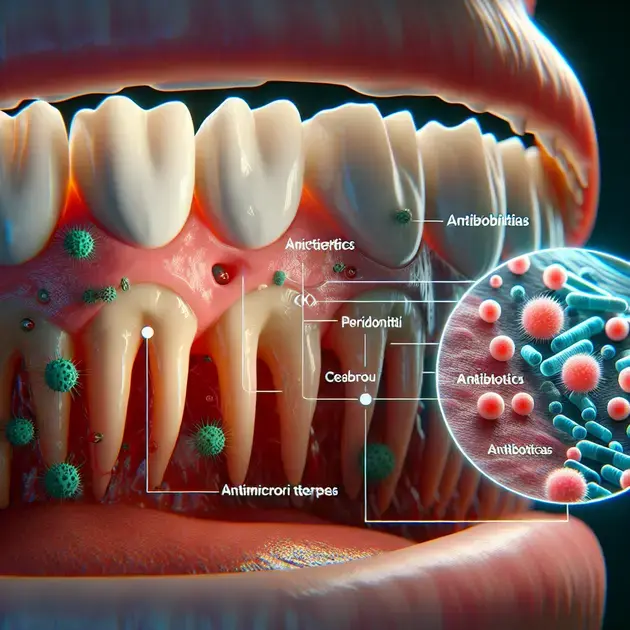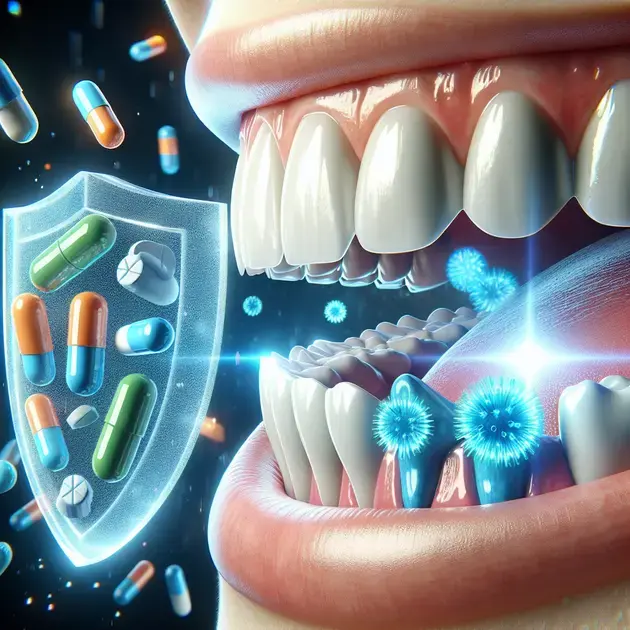Periodontitis is a serious gum infection that damages the soft tissue and destroys the bone that supports your teeth. Managing Periodontitis is crucial for maintaining good oral health. One option for treatment involves medication, which can play a key role in controlling the progression of the disease.
When it comes to Managing Periodontitis through medication, there are various options available. From antibiotics to antimicrobial mouthwashes, understanding the different medications and their benefits is essential for effectively treating this common dental issue.

Understanding the Role of Antibiotics in Periodontitis Treatment
Periodontitis, a severe form of gum disease, requires a comprehensive treatment plan that may include the use of antibiotics. These medications play a crucial role in managing the infection and promoting gum health. Understanding how antibiotics work in periodontitis treatment is essential for successful recovery.
Step-by-Step Guide:
1. Consult with your dentist or periodontist to determine if antibiotics are necessary for your treatment plan.
2. Your healthcare provider may prescribe antibiotics such as doxycycline, minocycline, or metronidazole to combat the bacteria causing the infection.
3. Follow the prescribed dosage and duration of the antibiotic treatment to ensure its effectiveness.
4. Monitor your gum health and any potential side effects while taking antibiotics. Report any concerns to your dental professional.
5. Combined with good oral hygiene practices, antibiotics can help combat periodontitis and support the healing process.
Exploring the Benefits of Antimicrobial Mouthwashes
Antimicrobial mouthwashes are an essential part of periodontitis management, as they can help reduce plaque buildup, fight bacteria, and promote overall oral health. Understanding the benefits of using antimicrobial mouthwashes can enhance your oral hygiene routine and support gum disease treatment.
Step-by-Step Guide:
1. Choose a reputable antimicrobial mouthwash like Listerine or Colgate that is specifically designed to combat bacteria in the mouth.
2. Rinse your mouth with the antimicrobial mouthwash for the recommended duration, typically 30 seconds to 1 minute.
3. Use the mouthwash after brushing and flossing to ensure a thorough clean and maximum benefits.
4. Antimicrobial mouthwashes can help reduce bacteria that cause gum inflammation and periodontal disease when used consistently.
5. Incorporate antimicrobial mouthwash into your daily oral care routine for ongoing protection against gum disease and improved oral hygiene.

**Understanding the Role of Antibiotics in Periodontitis Treatment**
Antibiotics in Periodontitis Treatment
Periodontitis is a severe gum infection caused by bacteria and can lead to tooth loss if left untreated. Antibiotics play a crucial role in the treatment of periodontitis by helping to eliminate the harmful bacteria causing the infection. These medications can be prescribed in various forms, including pills, mouth rinses, or gels, depending on the severity of the condition.
When antibiotics are used in combination with other treatments such as scaling and root planing, they can effectively reduce inflammation and promote healing in the gums. It’s essential to follow the prescribed dosage and duration of antibiotics to ensure optimal results and minimize the risk of developing antibiotic resistance.
However, antibiotics are not always the first line of defense in treating periodontitis. They are often reserved for cases where the infection is severe or has not responded well to other therapies. Your dentist or periodontist will determine the most appropriate antibiotic treatment based on the specific needs of your condition.
It’s important to note that antibiotics alone cannot cure periodontitis. They should be used as part of a comprehensive treatment plan that includes good oral hygiene practices, regular dental cleanings, and lifestyle modifications to maintain overall oral health.
Benefits of Antibiotics in Periodontitis Treatment
Antibiotics can provide several benefits in the treatment of periodontitis, including reducing the number of harmful bacteria in the gums, controlling infection, and preventing the spread of bacteria to other areas of the mouth. By targeting the underlying cause of the infection, antibiotics help to alleviate symptoms such as swelling, redness, and bleeding gums.
In addition to their antimicrobial properties, antibiotics can also help to promote the regeneration of damaged tissue and support the healing process in the gums. They work synergistically with other treatment modalities to improve outcomes and prevent the recurrence of periodontitis.
Furthermore, antibiotics can be particularly beneficial for patients with aggressive forms of periodontitis or those with compromised immune systems. By supplementing traditional periodontal therapies with antibiotics, healthcare providers can achieve better control of the infection and enhance the overall treatment results.
It’s essential to discuss the potential risks and benefits of antibiotic therapy with your healthcare provider to make informed decisions about your periodontal treatment plan. By understanding the role of antibiotics in periodontitis treatment, you can take proactive steps to improve your oral health and prevent complications associated with gum disease.
Conclusion
Understanding the role of antibiotics in periodontitis treatment is crucial for effectively managing this severe gum infection. Antibiotics play a vital part in eliminating harmful bacteria that cause the infection, working alongside treatments like scaling and root planing to reduce inflammation and promote gum healing. It’s essential to adhere to prescribed dosages to minimize antibiotic resistance risks and ensure optimal results.
While antibiotics are not always the initial choice for treating periodontitis, they are invaluable for severe cases or when other therapies prove ineffective. Dentists or periodontists determine the most suitable antibiotic therapy based on individual patient needs. However, it’s important to note that antibiotics alone cannot cure periodontitis; they should be part of a comprehensive treatment plan that includes good oral hygiene, regular cleanings, and lifestyle adjustments.
The benefits of antibiotics in periodontitis treatment are multifaceted. They help reduce harmful bacteria in the gums, control infections, prevent bacterial spread, and alleviate symptoms like swelling and bleeding gums. Beyond their antimicrobial properties, antibiotics stimulate tissue regeneration, supporting gum healing and preventing the recurrence of periodontitis. Particularly for aggressive forms or immunocompromised patients, antibiotics complement traditional therapies for better infection control and enhanced treatment outcomes.



